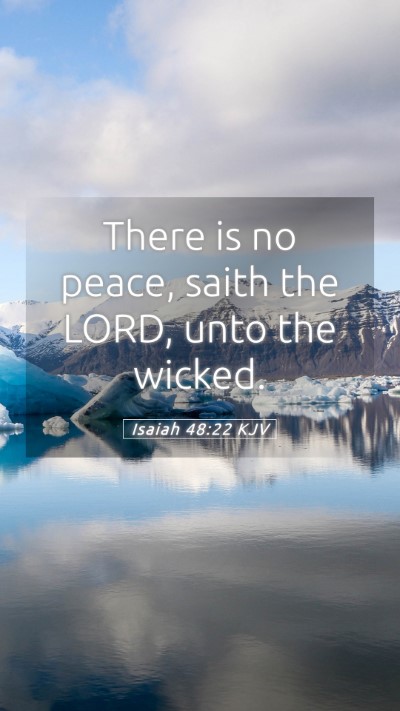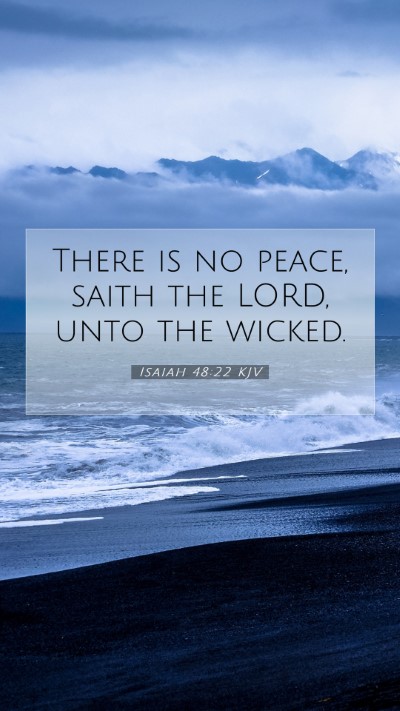Bible Verse Meaning
This passage from the Book of Isaiah presents a stark warning from God regarding the state of the wicked. The verse emphasizes that true peace is unattainable for those who live outside of God's will and righteousness. The nature of God's justice is such that those who choose a path contrary to His guidance will find themselves devoid of peace.
Insights from Public Domain Commentaries
-
Matthew Henry:
Henry explains that this declaration serves not merely as a proclamation but as an affirmation of God's character and judgment. The absence of peace for the wicked reflects God's divine justice. Those who rebel against God's commandments live in turmoil and unrest, and this lack of peace is a direct consequence of their actions. The phrase “the wicked” serves as a broader identifier for all who oppose God's law.
-
Albert Barnes:
Barnes emphasizes that this verse is part of a larger discourse where God is asserting His sovereignty and calling the people to repentance. The peace that God offers is contingent upon obedience to His word. The assurance of peace is a promise to the righteous, while the wicked are reminded of the restlessness that accompanies rebellion against God’s authority.
-
Adam Clarke:
Clarke provides an analysis of the social and spiritual implications of this verse. He argues that peace is not merely an absence of conflict but a wholeness that comes from aligning oneself with God's will. For those engaged in wicked deeds, this sense of peace eludes them, and they are marked by agitation and dissatisfaction. Clarke stresses that true contentment can only be found in a relationship with God.
Historical Context
The context of Isaiah illustrates a time of great turmoil for the Israelites, with warnings about the consequences of turning away from God. Understanding this historical background helps to clarify the weight of God's message through Isaiah. The people of Israel faced external threats and internal strife, exacerbated by their disobedience to God's commandments. This verse encapsulates the condition of a people wrestling with their estrangement from divine peace.
Significance of the Verse
The significance of Isaiah 48:22 lies in its illustration of God's unwavering justice. It reflects the broad theological principle that peace is a blessing from God and is intimately connected with righteousness. By using the term "wicked," God identifies specific behaviors that disrupt the relationship between humanity and the divine. The verse serves as a cautionary reminder about the spiritual dangers that arise from living in opposition to God's commandments.
Application of the Verse
For individuals seeking to understand the depths of their faith, this verse invites several applications:
- Self-Examination: Reflect on personal conduct and choices. Are they in alignment with God's teachings?
- Seek Righteousness: Pursue peace through righteous living as a means of drawing closer to God.
- Acknowledge Consequences: Understand that spiritual unrest can often be tied to one’s separation from God’s will.
- Encourage Others: Share insights with others about the peace that comes from following God, using this verse as a foundation.
Related Bible Cross References
- Romans 8:6: "For to be carnally minded is death; but to be spiritually minded is life and peace."
- 2 Thessalonians 3:16: "Now the Lord of peace himself give you peace always by all means. The Lord be with you all."
- James 3:18: "And the fruit of righteousness is sown in peace of them that make peace."
Conclusion
The exploration of Isaiah 48:22 offers rich insights into the nature of divine peace versus the turmoil of a wicked heart. As evident through the reflections of Matthew Henry, Albert Barnes, and Adam Clarke, understanding this verse fosters a deeper comprehension of the call to righteousness and the consequences of sin. Further study and reflection will benefit individuals in their journeys of faith, as they strive to embrace the promises of peace that God extends to His followers.


